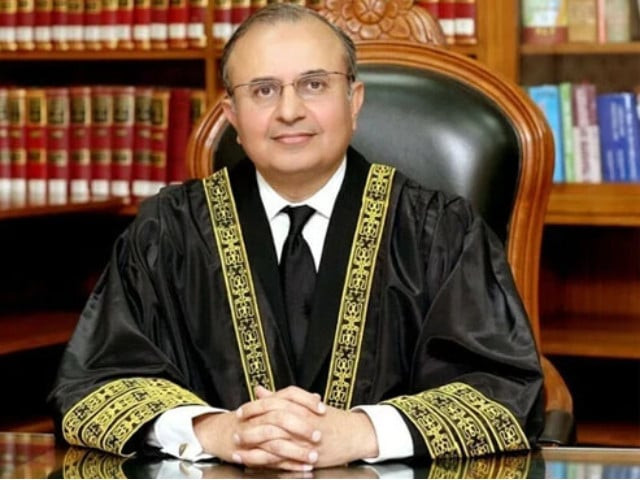Islamabad:
Once again, the president of the Supreme Court of Pakistan, Yahya Afridi, has refused to grant a noc to the senior judge of Puisne Mansoor Ali Shah to travel abroad to attend events.
It was learned that last month, Judge Syed Mansoor Ali Shah was invited to attend global constitutionalism 2025 at the Yale Law Faculty, University of Yale, USA, from September 10 to 13.
Judge Shah was being invited during the last five years to attend the event, in which the senior judges around the world participate in the dialogue with the main academics of Yale, Harvard and Princeton.
This year, Judge Shah was supposed to present a document on the ‘artificial intelligence and judge’.
Even Yale’s Faculty of Law had formally written CJP Afridi, seeking the official nomination of Judge Shah. On August 6, Judge Shah also made the same request.
Later, the SC registrar had responded to Yale’s Law Faculty that the Pakistan Supreme Court would not be able to facilitate the participation of Judge Shah in the event.
Giving reasons, the registrar said that the judicial year of the Supreme Court began on September 8 of each year and this time is traditionally marked by significant institutional activities, including a comprehensive session of judges in the Court to review and strategies for the following year, as well as an interactive commitment to legal fraternity.
It is also said that this year, the day assumes particular importance since the Supreme Court has recently promulgated a new edition of its rules, establishing a more comprehensive framework and promoted by technology for court operations. In this context, the presence and participation of all judges in the opening of the judicial year is indispensable for collective deliberation, the priority environment and the institutional management.
“In view of these convincing commitments, the Supreme Court of Pakistan would not be in a position to facilitate the participation of Judge Hon’ble in its dear event. We deeply value our institutional and academic ties and continue with hope of future opportunities for collaboration and commitment,” says the letter written by Yale Legal SC SC.
On August 15, Judge Shah wrote a letter to the CJP Afridi to obtain his response from his request for Noc.
He had given several reasons to justify his visit abroad. Judge Shah said he did not completely exhaust the summer holidays and during the mandate of CJP Afridi, he decided 3956 cases.
Similarly, Judge Shah said that he is not a member of the Constitutional Bank or any administrative committee, and now that the court has a strength of 25 judges, therefore, his temporary absence in any way would interrupt the operation of the Court.
Judge Shah said his trip is scheduled to start during the summer holidays (September 5) and conclude shortly after (September 13).
Judge Shah has also told CJP Afridi that an improper delay or a rejection not reasoned in a matter of this nature runs the risk of creating the perception that some judges are being penalized for having independent opinions, particularly when it has been granted to other judges for events of a much less academic or professional position.
“Such perceptions, whether precise or not, can be deeply harmful to the credibility and collegiality of this court. As the senior judge of Puisne of the Supreme Court, I am making this request with the expectation that it will be treated in the manner and with the courtesy it deserves,” says Judge Shah Carta.
Justice also told CJP that, in case you do not decide your application, it would be limited to sharing this correspondence with cozy institutions so that they know why they cannot travel and so that they can evaluate for themselves transparency, collegiality and respect for judicial independence within this court.
Judge Shah had also emphasized that the Supreme Court is not a regimented force such as civil service or the armed forces; He does not operate in a command and control system, but derives his strength from the independence of his judges.
“Restrictions, procedural obstacles and delays of the type found under their risk of administration that is perceived as measures aimed at directing the judges towards compliance instead of independence, a course that would weaken the constitutional foundations of the Court and corrode the very principles on which their authority rests,” says the letter.
Despite Judge Shah’s letter, CJP Afridi had refused to broadcast Noc to travel in the United States.
It was also learned that Judge Shah was also invited to speak in the New York City Association Association on September 8 and to participate in an academic dialogue with Professor Noah Feldman at Harvard University on September 10.
This is not the first time that CJP Afridi did not allow it.
In February he could not fly to Saudi Arabia for attending two events in arbitration due to lack of ex-pakistan license.
Judge Shah was invited to deliver key notes in two events in the Week of Arbitration in Riyadh, Saudi Arabia, organized by the Al Baraka forum and the organization of the Islamic-Arbitration Cooperation Center (OIC-AC).
During that week, Judge Shah also wanted to perform Umrah before the start of Ramazan.
The senior judge of Puisne had made a request to CJP Yahya Afridi for former Pakistan, which was left unanswered, which forced the Mansoor Judge to cancel his trip to Saudi Arabia, since its leaves could not be sanctioned.




